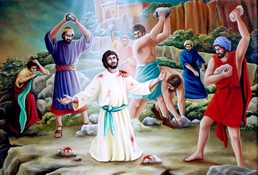Lives of the Saints
Our Models and Protectors
Spiritual Bouquet:
December 26

O.D.M. pinxit
Saint Stephen
Protomartyr
(† 35)
The Jewish origin of Saint Stephen is universally acknowledged; he is known and loved everywhere as the first follower of Christ to give to his martyred God love for love, blood for blood. It is not certain whether he was among the seventy-two disciples of Jesus; some believe he was of the Greek tongue and not a native of Palestine. He studied with Saint Paul and Saint Barnabas under the famous Doctor of the Law, Gamaliel, who, being a member of the Sanhedrin, attempted to stop the persecution of the Apostles. (Acts of the Apostles 5:34-40) What is certain, however, is that he distinguished himself among his brethren as an admirable Christian, replete with the gifts of the Holy Spirit. To his great beauty and angelic chastity were joined humility, patience, gentleness and charity, so perfect that they drew from all the faithful great admiration and esteem for him.
He was head of the seven disciples whom the Apostles named as deacons, to execute the works of charity which their mandate to preach did not permit them to carry out. Stephen manifested all the qualities one could wish for in a minister of charity and of the Gospel. He knew Scripture to perfection and was steeped in its divine spirit; he was endowed with invincible force because he feared nothing in the service of God. Everywhere in Jerusalem, he was proving Jesus of Nazareth to be the Messiah, and working great prodigies to confirm the truths he taught. Some believe he was the cousin of Saul, later Saint Paul; in any case, the latter, still a fire-breathing Pharisee, took offense at his boldness and presided at the scene of his martyrdom by stoning. The fervent deacon, insensible to his own fate, defended Christ before the Jerusalem tribunal with a perfection which enraged the proud authorities of Jerusalem, unwilling to recognize a humble carpenter of Nazareth for their Saviour. He boldly upbraided the chief priests with their hard-hearted resistance to the Holy Spirit. And when he accused them of putting to death, just as their forebears had treated the prophets who foretold Him, the long-awaited Just One announced by Moses, they stoned him without further delay. (Acts of the Apostles, chapter 7)
Saint Stephen died, beholding his Lord standing at the right hand of God. He imitated Him in death; crying out, Lord Jesus, receive my spirit! He concluded on his knees, Lord, do not impute to them this sin! And then he fell asleep, the narrative says.
His mortal remains were left outdoors to be devoured by beasts, but were protected by God; and Gamaliel, the Doctor of the Law, took the body of the martyr to his own country home, a few leagues from the city, where he buried him. His tomb was discovered miraculously in the fifth century, by the intervention of Gamaliel himself in a priest's dream. The greater part of his relics are still conserved in the Basilica of Saint Lawrence and Saint Stephen in Rome. His death was the signal for a great persecution of the Christians in Jerusalem, spurred on by Saul, who had approved his death. But Saint John Chrysostom remarks that because Stephen prayed, we have Saint Paul, whose conversion miraculously came about soon afterwards.
The New Testament: Acts of the Apostles; Les Petits Bollandistes: Vies des Saints, by Msgr. Paul Guérin (Bloud et Barral: Paris, 1882), Vol. 14